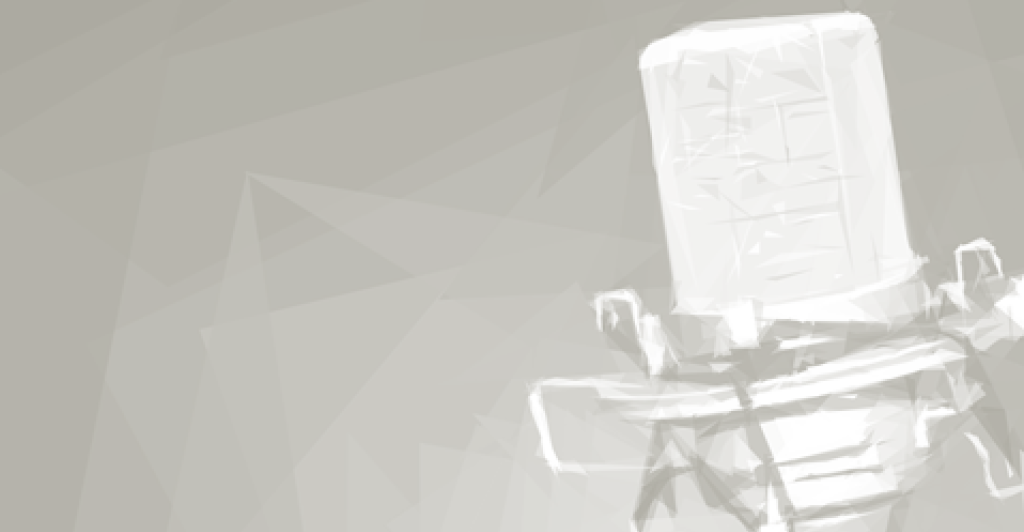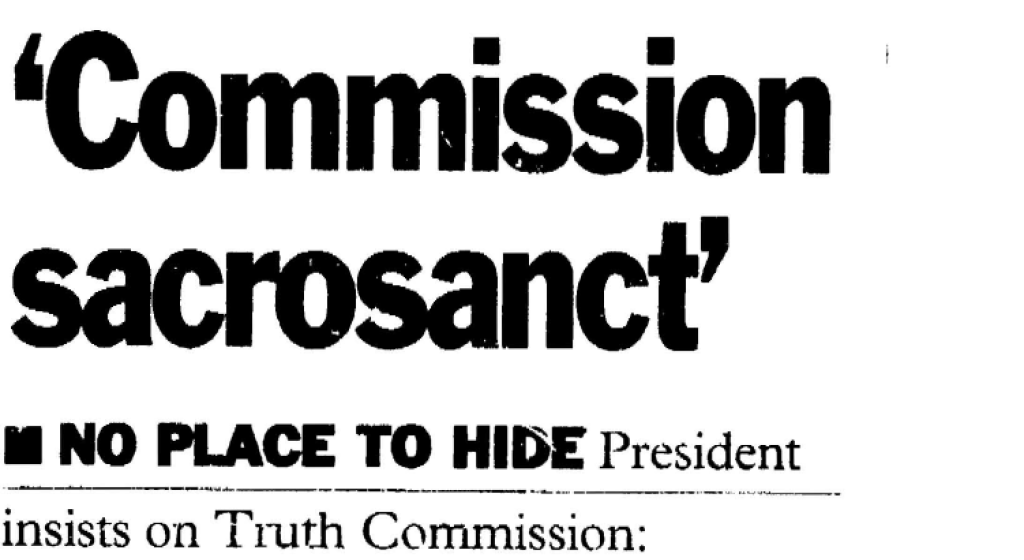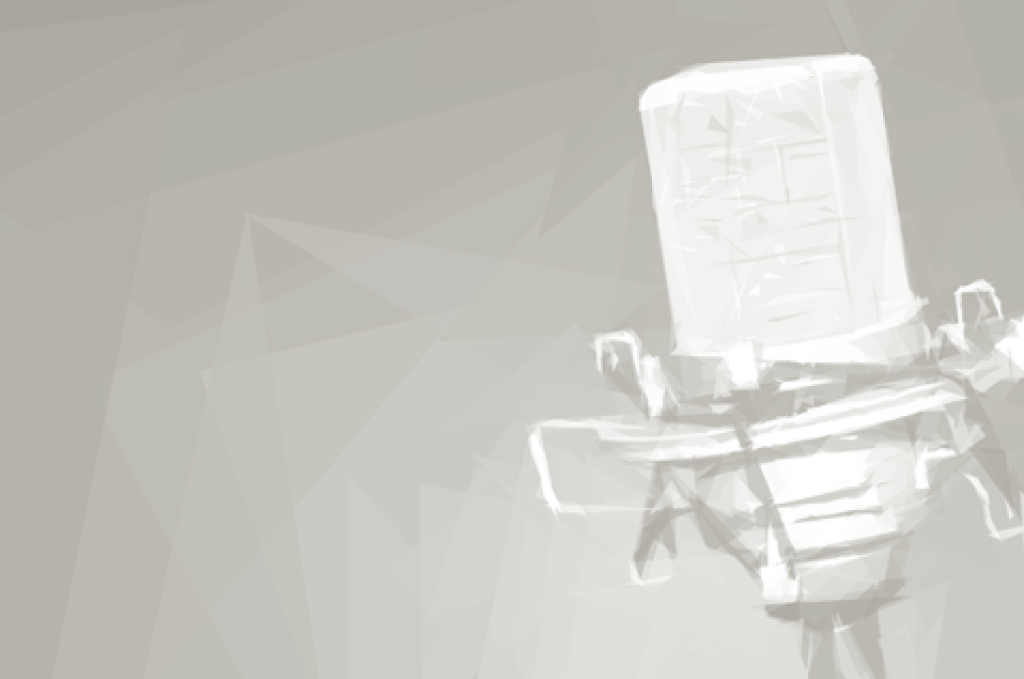Around the same time as the constitution was being finalised, the Truth and Reconciliation Commission process was being initiated. The legislation defining its mandate, the composition of the Commission and the processes it was to follow had taken months to negotiate, combining as it did two of the most sensitive issues of the transition – revealing human rights violations; and amnesty for those responsible for such violations.
Late in the pre-election negotiations discussions on blanket amnesty – seen by some on the government side as the last chance to stop a truth and reconciliation commission – came to nothing493
A post-amble on national unity and reconciliation was included in the interim constitution. Declaring that ‘the pursuit of national unity, the well-being of all South African citizens and peace require reconciliation between the people of South Africa and the reconstruction of society,’ it went on to say that the constitution laid a foundation ‘for the people of South Africa to transcend the divisions and strife of the past, which generated gross violations of human rights, the transgression of humanitarian principles in violent conflicts and a legacy of hatred, fear, guilt and revenge.’ In order to advance reconciliation and reconstruction, ‘amnesty shall be granted in respect of acts, omissions and offences associated with political objectives and committed in the course of the conflicts of the past.’494
Mandela had to deal with differences over the TRC at each stage: negotiations over the legislation; appointment of the Commission; TRC hearings; and publication of the report.
During the legislative process, in late 1994 and early 1995, leading members of the previous security establishment lobbied Mandela to avert establishment of the TRC or modify what was proposed.

This is the last chance we have to stop the Truth and Reconciliation Commission

Constand Viljoen took up Mandela’s ‘open door’ offer to raise the issue. He tried to persuade Mandela that the TRC would overall have negative rather than positive consequences, causing division as bad things done on both sides were relived.495 He was unsuccessful but got Mandela’s agreement that he should make a presentation to the Cabinet, in which he also argued that there was a danger of operatives being punished for actions in which senior officials and politicians were implicated.496
Viljoen did, later, persuade Mandela, after some hesitation, to support an extension of the date for submitting amnesty applications from December 1993 to the inauguration date in 1994. Viljoen use that to appear before the TRC and apply for amnesty for his plans to disrupt the election by force.

One discussion was about the wisdom – or not wisdom - of the TRC

Niel Barnard also raised the matter with Mandela personally. He too failed to persuade Mandela that the commission would be counterproductive. That was followed by a meeting at which Barnard brought General van der Merwe, still head of the police, to meet with Mandela at a safe house. Mandela said he understood their arguments, but disagreed with them – the past had to be opened up to inform people what had happened; it was the only way to start healing the wounds of the country’s past.497

I saw Mandela in his office on this issue
Van der Merwe’s stance was made public in a memorandum submitted by him as head of the police to the parliamentary portfolio committee on justice during its processing of the bill to establish the TRC. It effectively threatened that the police would release ‘wide-ranging and comprehensive evidence’ implicating cabinet ministers and politicians in the NP, ANC, IFP and other parties to gross human rights violations if they did not take collective responsibility for actions committed by the state or such organisations through individuals.’498
Throughout such encounters with resistance to the TRC, Mandela remained firm in his support for its establishment. He told the South African Agricultural Union in October 1994, ‘As far as I am concerned the Truth and Reconciliation Commission is going to take place in this country no matter who wants to hide…There can be no settlement if that commission is not appointed to investigate these sensitive questions. . . The question of a truth commission is very important. We want to bury the past. We can’t do that without rectifying the injustices of the past.’499
When PW Botha was called to the TRC, he refused, creating a dilemma for Mandela.
It’s a mistake to think that this transformation just took place without any hassle. We were faced with a situation of a civil war here where the right wing decided to stop the election by violence. We had to negotiate, to use people who were influential, who could stop that. I am not going to say any particular individual assisted us in that regard. But we had to use people who were our mortal enemies in order to defuse that. And we have to think about that when problems arise.
I have spoken to PW Botha twice on this question about the TRC. I’ve spoken to all his children; I have briefed the South African Defence Force, the South African Police Services, the Dutch Reformed Church and others because I know a little more … as to what is happening below the surface.
Mandela also asked Niël Barnard to help him persuade Botha, but Barnard declined: Botha would refuse and forcing him would make him a martyr.501 Botha never did appear before the TRC.
When the TRC produced its report there were reservations and criticisms from all sides. Mandela noted them, but accepted the report.

you became a martyr world-wide, an icon, because we acted wrongly with you
I had no hesitation in accepting the report of the TRC presented to me in October, with all its imperfections.
It was inevitable that a task of such magnitude, done in so short a time, and so early in a process that will still take many years to accomplish would suffer various limitations. And indeed the report itself highlights many of these.
It was also inevitable, given the nature of the divisions that do still run through our society, and the freshness of the wounds still to be healed that the judgements of such a body will jar with how some or others of us see matters.
As we anticipated, when the report was handed over in October, questions arose about an artificial even-handedness that seemed to place those fighting a just war alongside those who they opposed and who defended an inhuman system.
Further still, the practical consequences of the compromise that gave birth to the amnesty process as an instrument of peaceful transition are painful to many of the victims of human rights violations and their families.
Many who lost loved ones or who lived through terror that seemed incomprehensible in its cynical inhumanity will wonder at what seems to be the dismissal of the existence of a ‘third force’: the fact of the existence of a deliberate strategy and programme by the powers-that-be as they then were, to foment violence among the oppressed, to arm and lead groups that sowed death and destruction before and especially after 1990 ...
Questions have also been raised regarding the impartiality or otherwise of the Commission. And some have sought to find in the work of this body, a witch-hunt against a specific language group.
It is not my task to pronounce upon all these issues, and some of them may no doubt appear in a different light when the TRC gives a more complete account after the amnesty process is completed.
It will be for the national debate we are starting here today, to come to a resolution where that is possible.
What Mandela did insist on was the need for a national recognition of the nature of the past and a national effort to turn the TRC’s recommendations into an effective programme.
…The success of reconciliation and nation-building will depend on all sectors of our society recognising with the world, as did the TRC, that apartheid was a crime against humanity, whose vile deeds transcended our borders, and sowed the seeds of destruction whose harvest we continue to reap today.
About this, there can be no equivocation: for it is this recognition that lies at the very heart of the national pact that is our new constitution, of our new democracy and the culture of human rights that we are building together.
The recommendations of the TRC embraced accountability for gross human rights violations through prosecutions where amnesty had not been granted; speeding up socio-economic change and job-creation; and programmes of healing, rehabilitation and reparation in the form of grants.
Whatever its many pros and cons, here was a platform, in the full glare of domestic and world attention, which would provide an opportunity for the crimes and suffering of the past to be laid bare; and at the same time bring to public attention commissions or omissions in the crime against humanity.
The full impact of the process is yet to be understood; but at its door can be laid some political dynamics with implications for the evolution of the country’s politics.
Some wanted mere ‘forgiving and forgetting’, among them those who took as gross betrayal even the reluctant and forced co-operation of perpetrators of gross human rights violations and their leaders, including de Klerk and others in the National Party. Acknowledgement of participation, complicity or benefit from a system that was being dramatically exposed as anachronistic was hard to swallow. And many retreated to the argument that agreement to relinquish political power was adequate penance. It is a matter of conjecture what part attitudes to the TRC played in the decline in support for De Klerk and the New National Party within its primary (white) constituency; and inversely in the shift of support to the then Democratic Party with its more muscular ‘fight back’ campaign exploiting this mood.
On the other hand, reliving the horrific experiences of the targets of apartheid repression opened wounds festering below the surface. There was an expectation from the majority that, beyond the sacrifice of justice in pursuit of truth and reparations, the TRC process would bring about meaningful contribution by the beneficiaries of apartheid to righting the historical injustice through faster transformation.
A survey by the Human Sciences Research Council in December 1998 showed the polarisation. Among Africans, 72 per cent thought the TRC was ‘a good thing for the country’; among whites 72 per cent thought it a bad thing.503
The beginnings of this tension had not escaped Mandela; nor, on the other hand’ the fact that many within the white community did gradually embrace the TRC process and its implications for the new constitutional paradigm.
We are conscious of the concerns that some Afrikaner people have regarding, in particular, the work of the Truth and Reconciliation Commission.
It is, of course, no longer as easy as it once was to speak in any monolithic way about Afrikaners, just as it is not that simple for anyone to claim to speak on behalf of the Afrikaner people.
Afrikaners are spread throughout our society in different spheres, holding different positions and different viewpoints, speaking in different voices.
Afrikaners are an inextricable part of our rainbow nation, reflecting amongst themselves the rich diversity which is our strength.
Yet we do take notice of the voices raised in Afrikaans concerning the TRC, voices suggesting that its activities represent a witch-hunt.... The objectives and intentions of the TRC are clearly set out in the interim Constitution and in legislation.
We must emerge from this process with a clear picture of that part of our history. We must do justice as far as we can to those who suffered and we must end up on the road to lasting reconciliation, determined never to repeat such injustices against one another.
There is no place for any sense that a racial, ethnic, linguistic, religious or other group is collectively in the dock. The diversity of Afrikaner people means that Afrikaners will know that when a specific perpetrator of gross human rights violations, who is an Afrikaner, appears before the commission, it is not the Afrikaners in general who are being called to account, because, as with the other language and cultural communities, it is not in the nature of the Afrikaner as such to be brutal to others.

